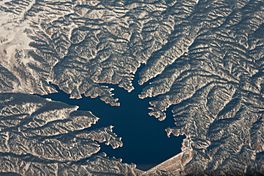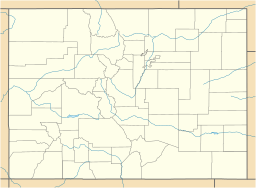Rampart Reservoir facts for kids
Quick facts for kids Rampart Reservoir |
|
|---|---|

Aerial view
|
|
| Location | Pike National Forest, El Paso County, Colorado, United States |
| Coordinates | 38°58′30″N 104°57′40″W / 38.975°N 104.9611°W |
| Type | reservoir |
| Basin countries | United States |
| Water volume | 13,000,000,000 US gal (0.049 km3) |
| Surface elevation | 9,000 ft (2,700 m) |
Rampart Reservoir is a beautiful lake located northwest of Colorado Springs, Colorado. It's nestled high up in the Pike National Forest, about 9,000 feet above sea level! This important reservoir holds a huge amount of water. It provides drinking water for the people living in Colorado Springs. It's also a very popular spot for outdoor fun like boating, biking, and hiking.
Building Rampart Reservoir
Planning for Rampart Reservoir started in the 1960s. Colorado Springs was growing fast. More people meant they needed more drinking water.
In 1967, the city decided that the new reservoir would be open for public fun. This would happen after all the necessary facilities were built.
The dam for the reservoir was finished in 1969. It is about 3,400 feet long and 230 feet high. Five years later, the reservoir was completely full of water. It then opened to the public as a place to play and relax.
Fun at the Reservoir
Rampart Reservoir is a great place for outdoor activities. You can go boating on the water. Many people enjoy mountain biking on the trails around the lake. Hiking is also very popular here.
The Colorado Parks and Wildlife has put fish into the reservoir. They continue to add fish today. This makes it a good spot for fishing too!
Important Closures
Rampart Reservoir had to close on June 23, 2012. This was because of a big wildfire called the Waldo Canyon fire. The fire was very close and made the area unsafe.
The reservoir reopened for visitors on Friday, May 24, 2013. At first, boats were not allowed. This helped keep everyone safe while the area recovered.
Learn More
- U.S. Forest Service. "Rampart Reservoir Recreation Area", Fs.fed.us. Accessed June 1, 2015.
 | Valerie Thomas |
 | Frederick McKinley Jones |
 | George Edward Alcorn Jr. |
 | Thomas Mensah |



